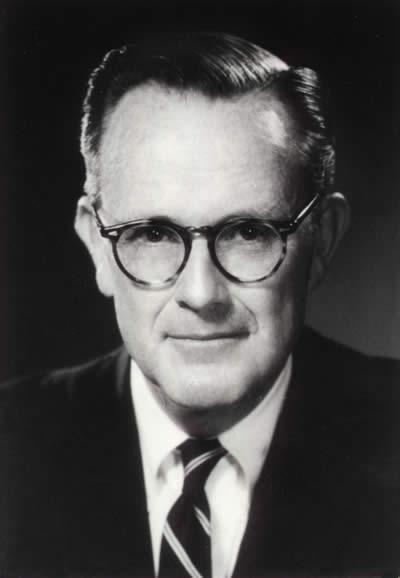Biography
Philip A. Hart was born on December 10, 1912 in Bryn Mawr, Pennsylvania, the son of a local banker. He graduated from Georgetown University in 1934 where he graduated cum laude and met the brother of Jane C. Briggs, the woman he later married. She was the daughter of Detroit industrialist Walter C. Briggs, who also owned the Detroit Tigers baseball team. Hart went on to the University of Michigan law school, graduating in 1937. In 1938, he was admitted to the Michigan State Bar and became an associate in the Detroit firm of Beaumont, Smith & Harris. He earned a distinguished Army record in World War II rising to the rank of lieutenant colonel at the time of this discharge in 1946. He was seriously wounded by a mortar fire on Utah Beach in Normandy on the first day of the Allied invasion. He was transferred to the Percy Jones Army Hospital in Battle Creek, Michigan where he became good friends with future U.S. Senators Robert Dole (see additional article below) and Daniel Inouye. He was decorated with the Bronze Medal, Invasion Arrowhead, and Purple Heart.
Hart’s public service career began in 1949 when he became Michigan’s corporation and securities commissioner. Over a span of 10 years he served as director of the Office of Price Stabilization in Michigan, U.S. attorney for eastern Michigan, legal adviser to Michigan Governor G. Mennen Williams. In 1954 he was elected as the 49th Lieutenant Governor of Michigan serving with Governor Williams for two-terms ending in 1958. His second-term re-election in 1956 made him the first Democrat in Michigan to serve two terms as lieutenant governor.
He was elected to the United States Senate in 1958, defeating incumbent Republican Charles E. Potter. He would be re-elected by overwhelming majorities in the 1964 and 1970 elections. In his 18 years as Michigan’s Senator, Hart worked tirelessly for passage of the civil rights laws and for measures that would protect consumers from powerful big business interests. He was not known for fiery words or sensational headlines, but was a man held in great esteem by his colleagues – Republican or Democrat, Liberal or Conservative for his moral and ethical standards earning the title “Conscience of the Senate. To him, politics was the noble art of governing and governing was about building a better future for our children and our children’s children. Education, the environment, civil rights and economic opportunities for all citizens — these were his causes to build upon for the people of Michigan and the citizens of the United States.
Hart announced in June 1975 that he would not seek a fourth term in the U.S. Senate. One month later doctors discovered he had cancer. That year, the Senate voted to name the new Senate office building after Philip A. Hart. The vote was 99 to 0 with Hart abstaining. It would be the first time a federal government building was named after one still living. Senator Philip A. Hart died on December 26, 1976 at his home in Washington D. C with his wife, Jane and children by his side. His cremated remains were later taken back home to Michigan – St. Anne’s Catholic cemetery – Mackinac Island.
“He was not afraid to be in the minority nor did he allow the shifting winds of day-to-day politics to cloud his perceptions of what was right…He has left us a legacy of honor whose preservation is the only tribute he would want.”

